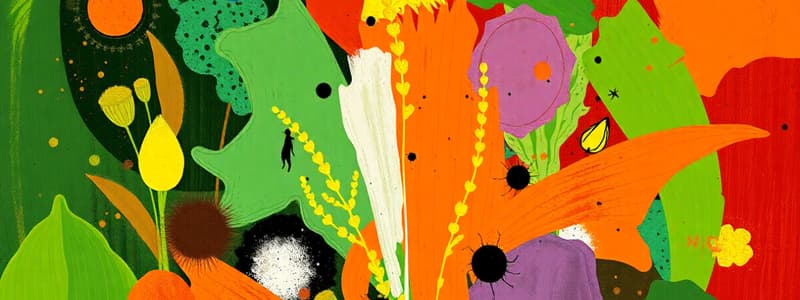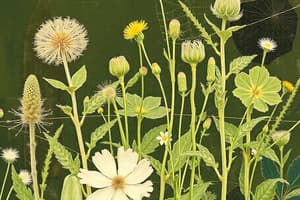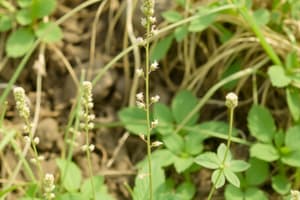Podcast
Questions and Answers
Which of the following species does not reproduce asexually?
Which of the following species does not reproduce asexually?
- Tridax prucumbens (correct)
- Fimbristylis littoralis
- Cynadon dactylon
- Cyperus rotundus
What type of weed can grow vegetatively, produce seeds, and live for more than two years?
What type of weed can grow vegetatively, produce seeds, and live for more than two years?
- Annual weed
- Dicot weed
- Perennial weed (correct)
- Biennial weed
What enables Cyperus rotundus to persist in its environment?
What enables Cyperus rotundus to persist in its environment?
- It produces asexually (correct)
- It produces sexually
- It is a broadleaf plant
- Its seeds have a short viability period
Why is it difficult to identify weeds at the seedling stage?
Why is it difficult to identify weeds at the seedling stage?
What type of weed is completely submerged in water?
What type of weed is completely submerged in water?
What role do weeds play in controlling soil erosion?
What role do weeds play in controlling soil erosion?
Which of the following weeds is recognized for its use as a trap crop for the Asian corn borer?
Which of the following weeds is recognized for its use as a trap crop for the Asian corn borer?
What is one economic importance of weeds?
What is one economic importance of weeds?
How are biennial weeds characterized?
How are biennial weeds characterized?
Which of the following is NOT a benefit derived from weeds?
Which of the following is NOT a benefit derived from weeds?
What classification do weeds fall under if they last for more than two years?
What classification do weeds fall under if they last for more than two years?
Which of the following properties do some weeds possess that can help control nematodes?
Which of the following properties do some weeds possess that can help control nematodes?
What is a common misconception about weeds?
What is a common misconception about weeds?
What is the primary reason weeds are considered to be a problem in agro-ecosystems?
What is the primary reason weeds are considered to be a problem in agro-ecosystems?
Which characteristic is commonly associated with serious weed problems?
Which characteristic is commonly associated with serious weed problems?
How are weeds defined in relation to humans?
How are weeds defined in relation to humans?
What role do weeds play in relation to crops and other pests?
What role do weeds play in relation to crops and other pests?
Which statement best defines the origin of many weeds?
Which statement best defines the origin of many weeds?
What is a misconception about weeds?
What is a misconception about weeds?
Which of the following scenarios accurately portrays the adaptive nature of weeds?
Which of the following scenarios accurately portrays the adaptive nature of weeds?
In what way do weeds affect the economic value of agricultural products?
In what way do weeds affect the economic value of agricultural products?
Which of the following defines creeping perennials?
Which of the following defines creeping perennials?
Which type of aquatic weed is characterized by having its roots attached to the soil, while the leaves remain above the water surface?
Which type of aquatic weed is characterized by having its roots attached to the soil, while the leaves remain above the water surface?
What is a distinguishing feature of sedges compared to grasses?
What is a distinguishing feature of sedges compared to grasses?
Which of the following is true about epiphytic weeds?
Which of the following is true about epiphytic weeds?
What distinguishes the grasses from other plant families?
What distinguishes the grasses from other plant families?
Which of the following is an example of a submergent aquatic weed?
Which of the following is an example of a submergent aquatic weed?
Which term refers to terrestrial weeds found specifically in rice fields?
Which term refers to terrestrial weeds found specifically in rice fields?
What characteristic describes a ligule in grasses?
What characteristic describes a ligule in grasses?
Which of the following is an example of a creeping weed?
Which of the following is an example of a creeping weed?
Which of these weed species is categorized as a broadleaf?
Which of these weed species is categorized as a broadleaf?
What is the primary characteristic of herbaceous weeds?
What is the primary characteristic of herbaceous weeds?
What does the term 'persistence' refer to in the context of weeds?
What does the term 'persistence' refer to in the context of weeds?
Which of the following weed types is classified as woody?
Which of the following weed types is classified as woody?
What is a common growth habit of weeds found among plantation crops?
What is a common growth habit of weeds found among plantation crops?
Which measurement indicates how well a weed can adapt to changes in its environment?
Which measurement indicates how well a weed can adapt to changes in its environment?
Which of these weeds is typically considered herbaceous?
Which of these weeds is typically considered herbaceous?
Flashcards are hidden until you start studying
Study Notes
Weed Science Defined
- Weed science examines weed establishment, spread, impact, characteristics, identification, and control.
- Weeds are plants that can be harmful to agricultural ecosystems.
- Weeds have adapted to thrive in human-influenced environments.
Weed Characteristics
- Weeds are often considered noxious due to their adaptability.
- Weeds possess characteristics that promote persistence and competitiveness, often shared with crops.
- Not all unwanted plants become major weed problems.
Relationship Between Weeds, Crops, and Other Pests
- Weeds are pests, like insects and diseases, and negatively affect agriculture.
- Weeds compete with crops for resources such as nutrients, water, sunlight, and space.
- Weeds may lower the quality of crop products and serve as hosts for insects and diseases.
- Weeds can be beneficial, providing soil erosion control and livestock feed.
Importance of Weeds
- Weeds contribute organic matter and nutrients to the soil.
- Weeds help prevent wind, water, and soil erosion.
- Some weeds serve as animal fodder, leafy vegetables, and possess medicinal properties.
- Weeds have economic importance and can be used ornamentally or for hedging.
- Weeds can have nematicidal properties, controlling nematodes.
Weed Classification
By Life Cycle
- Annuals complete their life cycle within a year or growing season.
- Examples include Phyllanthus niruri and Euphorbia hirta.
- Biennials complete their life cycle over two years.
- An example is Wild carrot (Daucus carota subsp.maximus).
- Perennials survive for more than two years and reproduce via seeds or vegetatively.
- Simple perennials reproduce only by seeds.
- Examples include Chromolaena odorata and Sida acuta.
- Creeping perennials reproduce by seeds and through vegetative means like rhizomes, runners, stolons, tubers, and bulblets.
- Examples include Centella asiatica and Commelina diffusa.
- Simple perennials reproduce only by seeds.
By Habitat
- Terrestrial weeds live on land.
- Subcategories include rice field, garden, grassland, wasteland, forest, and field weeds.
- Aquatic weeds live in water.
- Floating weeds grow on the water surface and aren't rooted in the soil.
- Example: Eichhornia crassipes
- Emergent weeds have roots in the soil and leaves above the water surface.
- Example: Monochoria vaginalis
- Submergent weeds have roots in the soil and are fully submerged.
- Example: Hydrilla verticillata
- Floating weeds grow on the water surface and aren't rooted in the soil.
- Epiphytes need a host plant for support and lack roots.
- Example: Lichens, algae, ferns, orchids.
Morphology
- Grasses belong to the Graminae family.
- Characteristics include cylindrical hollow stems with nodes and internodes, narrow leaves with parallel veins, and a ligule at the leaf sheath-leaf blade junction.
- Example: Eleusine indica (Goose grass)
- Sedges belong to the Cyperaceae family.
- Characteristics include a triangular solid stem lacking nodes and internodes, long leaves with parallel veins, no ligule, fused leaf sheaths forming a tube around the stem, and angular or triangular stems.
- Example: Cyperus rotundus (Nut sedge)
- Broadleaves belong to other families.
- Characteristics include expanded leaves with net veins in various sizes, shapes, and arrangements.
- Example: Ipomea triloba (Kamote-kamotehan)
Growth Habit
- Creeping weeds have parts that spread along the ground.
- Example: Cynadon dactylon
- Vines are common among plantation crops like banana and pineapple.
- Shrubs are common in cattle ranches in the Philippines.
- Examples: Chromolaena odorata and Lantana camara
- Trees are considered weeds when they grow in unwanted areas.
- Herbaceous weeds are soft-bodied and generally easier to control chemically.
- Example: Portulaca spp.
- Woody weeds are hard to control due to their woody texture.
- Example: Lantana camara
Ten World's Worst Weeds
- The text highlights 10 of the world's most problematic weeds.
- Infographics can be used to illustrate weed characteristics, classification, and impact on agriculture.
Importance of Weed Identification
- Early identification of weeds is essential for effective control.
- Weed identification can be challenging at the seedling stage due to similarities among species.
Relationship of Weeds to Crop Production
- Weeds are considered pests in most agricultural settings.
- Weed presence can significantly disrupt crop production.
Classification of Aquatic Weeds
- Emergent weeds have roots in the soil and leaves above the water surface.
- Floating weeds live on the surface and aren't rooted.
- Submergent weeds are completely submerged.
- Terrestrial weeds are land-based.
Understanding Weed Control
- Weed control methods need to be adapted based on the type of weed present.
- Herbicides are often used for weed control but can have environmental consequences.
- Mechanical control methods such as hand weeding and tillage are also used.
Studying That Suits You
Use AI to generate personalized quizzes and flashcards to suit your learning preferences.




